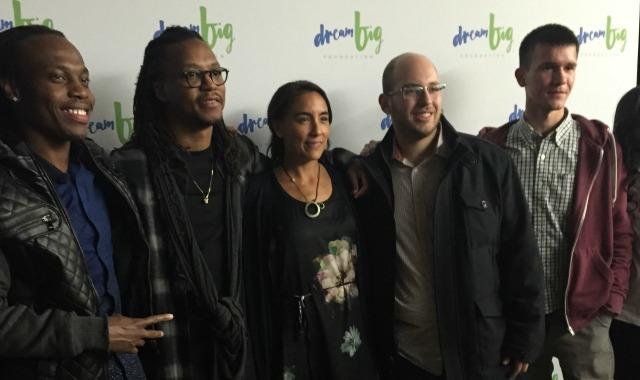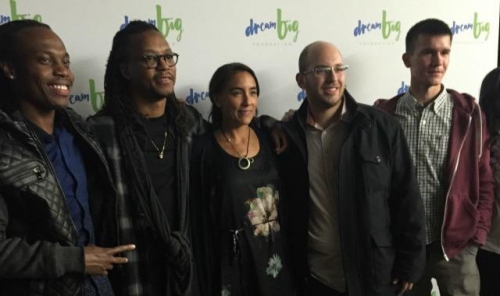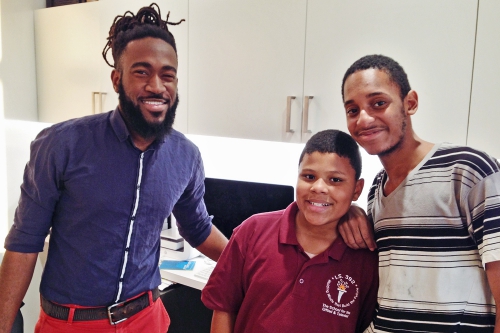Moving From Idea To Prototype in Underserved Neighborhoods
Henry Crown Fellow Di-Ann Eisnor is working to bridge the wealth gap in the US by partnering with her fellow Henry Crown Fellow Wasalu Jaco to found Neighborhood Start Fund, a microfund for innovation.
AGLN: What is the problem you are trying to address?
DE: The problem Neighborhood Start Fund is trying to solve is building onramps to entrepreneurship where they don’t currently exist. And those onramps are very important – just from ‘How do you rally a community around you to help you figure out what is a good idea?’, ‘How do you scale your idea?’ Even simple things from ‘How do you build a team?’ to ‘How do you trademark a company’, all the way through ‘How do I look at this as something that can be really, really big?’
AGLN: Tell me about the importance of investing in underserved neighborhoods.
DE: The importance two-fold. One is investing in the overall American economy. We have a lack of diversity of ideas and I think in general, if we can be more proactive in reaching out to places where it’s very difficult to get funding or have entrepreneurship, then we’ll have better, more interesting, more diverse ideas for innovation in the U.S. On the other side, from the neighborhood perspective, you have all of these neighborhoods that are underserved, that are having economic difficulties, high crime, different environments, simultaneously, there’s a lot of optimism and energy and activity around building up these neighborhoods. So I think entrepreneurship is a really important offering to bring to the table when we think about what we want our neighborhood to be like, what do we want our future to be like.
AGLN: Why is this a personal mission for you?
DE: The personal mission component starts from the fact that I was born and raised in an underserved neighborhood and I feel really grateful for the position that I’m in now, where I have access to a lot of resources. Not just financial, but knowledge based, a network of people and peers who know how to build companies, who have really been able to make a big impact. That’s the whole thing about the Henry Crown Fellowship, they are working with leaders in transition to try to figure out how to make us better and help us take further action. And that’s what we’re trying to do here.
AGLN: What was the inspiration for the project?
DE: When you’re sitting in a Henry Crown seminar there’s a tremendous amount of debate and you’re really reaching to bring your best ideas to the table and you’re reaching to tie them to action. I was working on some concepts around wealth inequality, which matters a lot to me, being brought up poor, and now being in the fortunate situation that I’m in right now financially, that was my big topic. I spent time debating and working through it with Wasalu and we decided that we would work on this together and we would start a micro fund and that we could be great partners in this way.
AGLN: How does Neighborhood Start Fund work?
DE: We start by opening a pitch competition in the neighborhood we’re working in. We invite people to come up with their ideas and submit them online; then we make sure that we have judges that are local to the neighborhood as well as judges that are successful entrepreneurs. We select finalists and then there is a live pitch competition. During that process, we provide coach pitching. It’s easy to underestimate the amount of time it takes to tell a good story about your idea, to learn to do that effectively, and to learn to do that on stage. So there’s a lot of coaching that goes into the development of the idea itself and to pitching it on stage. Finally, we fund the winners from the competition to build their prototype.
So the model is that we take people from idea to prototype, at prototype we want to get them into the more traditional seed investment environment, raise their profile, bring in other investors, and get them even more resources. The really cool thing is, this is not about small businesses, and this is not about social impact either, this is about really big, high potential businesses that can make a lot of money. We want people thinking big. There are enough options for small businesses. Secondly, it’s not impact in that we’re also doing this because we think this is a great financial opportunity. If we can have some great examples of huge financial successes from our company, then it will raise visibility and bring in more investors from all over to be interested and looking at companies from these neighborhoods, and that’s really what we want. We want to be the tip of the iceberg. The other great thing about the model is that from the investment that we make in the companies, if there is a big financial win, 50% of the profits that would go to our fund get reinvested in that specific neighborhood. It’s a way to give back and to keep this microeconomic engine going.
AGLN: What impact have you seen thus far and what impact do you hope to see?
DE: It’s beautiful, the small wins we’ve had already. One of the biggest surprises is that the original cohort of nine is still getting together and helping one another. So that’s been a beautiful success. The other one is watching the entrepreneurs go from taking this idea and going through all the difficult times that you have as an entrepreneur. Because half of being an entrepreneur is being able to be optimistic in the face of all of these challenges.
But, I won’t be happy until we have at least one really big financial success for our company – that’s when we’ll know we’ve proven the model that building these inroads will help make these neighborhoods competitive with companies coming out of Silicon Valley. I would love to see the face of entrepreneurship in the US be much more diverse, much more interesting, much more innovative. And to see the next generation of businesses come from anywhere, not just from business schools and Silicon Valley.
Other Recent Posts
The final day of the 2019 Resnick Aspen Action Forum closed with a celebration of intergenerational perspectives that included presentations from young leaders and a discussion between AGLN Moderator and South African Fellow Heather Sonn and Keith Berwick, long-time friend and founding executive director of the Henry Crown Fellowship. ...
When Anousheh Ansari was seven years old, she drew a photo of a rocket flying through space and set her eyes on exploring outer space being astronaut. There was no space program in Iran at the time and the chances of Ansari becoming an astronaut were slim. “I like to prove people wrong,” said Anousheh Ansari on stage at the 2019 Resnick Aspen Action Forum. On ...
The 2019 John P. McNulty Prize laureates, five extraordinary individuals, shared their courageous and bold social impact ventures at the Resnick Aspen Action Forum on Wednesday night. McNulty Foundation President Anne Welsh McNulty, who founded the award in honor of her late husband, described the McNulty Prize as a call to action. “You have shown ...
Borders are a part of life –– whether internal, invisible, geo-political or otherwise. Borders can help and they can harm. Borders are powerful and they can also be a form of power. Understanding the borders that are around and within us can lead to greater self-awareness and open the path for making great change in the world. With inspiration from the ...
1. Draw inspiration from other participants Over 1,000 Action Pledges have been made since the inaugural Action Forum in 2013. Watch the video below on some highlighted Action Pledges. 2. Find your sweet spot The most exciting Action Pledges come from what we call your sweet spot, the intersection of your passions, talents, and your community’s ...




Leave a Comment